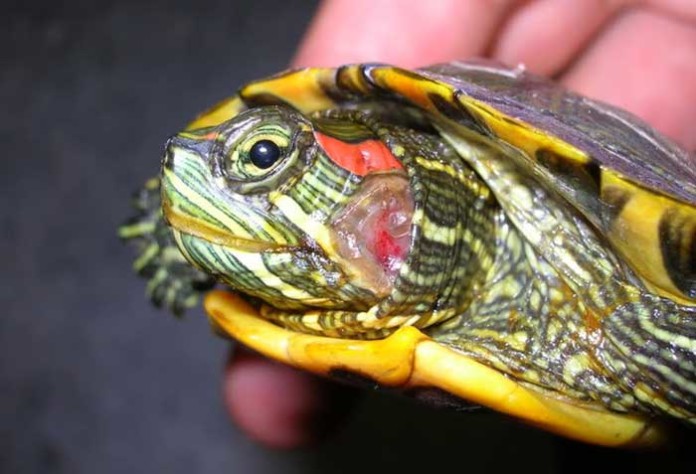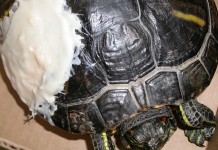A variety of problems can arise when you have a red eared slider. Though many such issues are a result of improper food or housing, sometimes the unexpected happens. Another pet may attack and hurt your turtle, a child could open the turtle’s tank and drop the turtle, or any number of awful circumstances. The best way to prepare for these circumstances is to have a turtle first aid kit on hand and educate yourself about such events beforehand.
Some red eared slider problems caused by exposure to dirty water are easily treated at home. In fact, many veterinarians will simply prescribe the exact same thing that you’ll see hear or simply have no clue as to what to do when faced with a sick red eared slider. A fungal infection (very common in sliders), for instance, can be treated by a warm saltwater bath and soft sponge scrub for 30 minutes every day. You can also treat the infected areas with an antiseptic like povidone-iodine.
Another common issue with sliders is shell rot. For shell rot, make a dry box to keep your turtle in while you are treating him. Shell rot needs water to grow and keeping it dry will keep it under control. Make sure the dry box is warm and well-lit like his regular tank. Scrub your slider’s shell gently with a toothbrush and warm water, and let him swim for 20 minutes a day in clean water (not his tank). Once or twice a day, apply hydrogen peroxide on cotton balls to his shell, keeping it away from his eyes. Clean the shell with your povidone-iodine and don’t wipe it off until it’s time for your slider to swim the following day. Keep this up daily until the shell rot goes away.
Respiratory infections in red eared sliders are normally caused by cold water. If you see the symptoms of a respiratory infection, buoyancy problems, runny nose, wheezing, lethargy, or disinterest in food, remove your slider from his tank if he is housed with other sliders, as respiratory infections are highly contagious. If he is housed by himself, give him a tank of warm, clean water. The water in this tank should be kept a few degrees warmer than normal (82-85 degrees Fahrenheit) to raise the turtle’s body temperature to its preferred body temperature and its immune system to peak efficiency.
If your turtle suffers any sort of major trauma, such as a cracked shell or animal attack, you should seek veterinary help as soon as possible. If you can’t get to one until the following day, keep your slider dry, warm, isolated and free of stress until he can see a vet.
No matter the issue, if your slider doesn’t show signs of improvement in 2-3 days, always seek the help of a vet. A vet can prescribe any antibiotics or surgery if need be.
Recommended:
Repta-Aid Critical Care Formula










